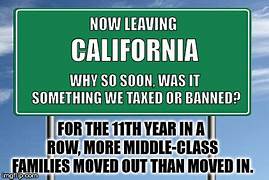Thanks to Prop. 19, in Marin County were they normally have about 50 transfers of property from parents to children, since November there have been 660. This before the State, via Prop. 19, takes the property from the parents when they die. The taxes will be too high for the children to pay, forcing them to sell, like it or not as Newsom would say.
“Marin County Assessor-Recorder-County Clerk Shelly Scott said her office processed 660 parent-to-child transfers between Nov. 4 — immediately after voters passed Proposition 19 — through Feb. 16, the last day property owners could take advantage of former parent-to-child rules.
Scott said her office processed just 54 parent-to-child transfers during the same period in 2019 and 2020.
Willard said, “The 600 people who made the transfer in Marin are probably only a fraction of those who might have wanted to had they been given more time to investigate what needed to be done and find an attorney who would take them on.”
There are concerns that Prop. 19 could deal a blow to Marin’s agricultural community, which includes a number of intergenerational farming and ranching operations.
Prop. 19 ends the family farm in Marin and every other county in the State. The giant agriculture corporations that supported Prop. 19 knew that after a few years family farms might be a quarter acre, at best. The big guy will be able to buy the farms, pennies on the dollar. This is called corporate socialism—corporations in a cabal with government to steal private property.
Proposition 19 unleashes wave of Marin property transfers

By Richard Halstead, Marin Independent Journal, 4/24/21
The passage of Proposition 19 in November has set off an avalanche of Marin residents transferring their estates to their heirs.
Critics of the initiative say the transfers illustrate why its implementation should be rolled back, either temporarily or permanently.
“I believe voters were really misled, and didn’t know what they were voting on and how it affected them,” said Mimi Willard, founder and president of the Coalition of Sensible Taxpayers.
The initiative, which narrowly passed with 51% of the vote, increased the portability of Prop. 13 property tax protections for homeowners who are 55 or older. The measure allows up to three moves in a lifetime and places no restrictions on where the new property is located.
Prop. 19 also altered the taxation of family-property transfers. Instead of being excluded from reassessment, children who inherit a home or other property will receive a new tax bill based on a current market-rate assessment.
Previously, under Prop. 13, the increases in assessed value were capped at a maximum of 2% per year.
Marin County Assessor-Recorder-County Clerk Shelly Scott said her office processed 660 parent-to-child transfers between Nov. 4 — immediately after voters passed Proposition 19 — through Feb. 16, the last day property owners could take advantage of former parent-to-child rules.
Scott said her office processed just 54 parent-to-child transfers during the same period in 2019 and 2020.
Willard said, “The 600 people who made the transfer in Marin are probably only a fraction of those who might have wanted to had they been given more time to investigate what needed to be done and find an attorney who would take them on.”
There are concerns that Prop. 19 could deal a blow to Marin’s agricultural community, which includes a number of intergenerational farming and ranching operations.
“That potential exists,” said Sam Dolcini, who runs a beef cattle ranch near the Marin-Sonoma border.
Dolcini said the measure passed quickly and with little scrutiny by the agricultural community, which was more focused on Proposition 15. That measure, which failed, sought to exempt commercial property, including farmland, from Proposition 13 tax protections.
Dolcini isn’t sure how many of the county’s farmers and ranchers were able to transfer property prior to the Prop. 19 deadline in February.
“It was weeks before there was even answer as to whether it passed or not,” Dolcini said. “And then the initiative had language that called for interpretation by the Franchise Tax Board.”
“So you ended up with this tiny window for constituents to try to respond to it,” he said. “It’s absolutely the craziest thing I’ve ever seen.”
Dolcini said it remains unclear whether grazing and farmland will be included in the reassessment or if the higher tax value will apply only to houses and farm buildings.
Willard said many trust and estate attorneys didn’t fully understand what was in the measure before the deadline and the few who did were in short supply, making it hard for people to take appropriate action.
“Only a person of some fairly substantial means — who had a fancy estate planning attorney — could afford to pre-emptively transfer their property prior to this deadline,” Willard said.
“The way that this worked out was very unfair to a middle- or lower-middle-class person who was able to afford a home but wasn’t able to protect that home as part of the estate for the next generation,” she said. “This was pretty much the only hope of the next generation of people who grew up in Marin to be able to afford to live here.”
Sen. Patricia Bates, a Republican from Laguna Niguel, has introduced Senate Bill 668, which would delay the effective date of this section of Prop. 19 until Feb. 16, 2023.
Scott said she supports the bill.
“Prop. 19 was approved by the voters but some of the effects of Prop. 19 were and are still unknown,” she said. “If SB 688 were passed it would allow a grace period for those who did not understand the limitations of Prop. 19 and would allow more time for intergenerational transfers.”
Prior to the November election, Marin County supervisors split over whether to support the initiative.
Supervisor Damon Connolly, who said he was inclined to support Prop. 19, noted that the increased tax revenue resulting from the modifications to the parent-child exclusions would go to local firefighting efforts and counties.
Supervisors Katie Rice and Kate Sears said they opposed Prop. 19, but not because it would result in the value of property passed to heirs being reassessed. Rice and Sears objected to the expansion of the portability of Prop. 13 property tax protections.
As a compromise, Supervisor Dennis Rodoni and Supervisor Judy Arnold voted with Connolly to remain neutral on the initiative.
“I have come to understand that Prop. 19 will have many impacts that need to be better understood, so adding time before implementing makes sense,” Rodoni said. “Clear guidelines would be helpful and if that takes a couple of years, we should wait.”



